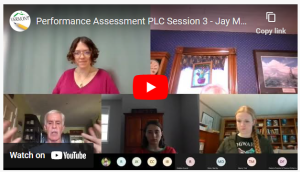Vermont Comprehensive Assessment System
The Agency of Education coordinates the implementation and administration of all components of the Vermont Comprehensive Assessment System (CAS), including the development of alternate assessments. The Agency also identifies, analyzes, and reports on outcomes and data measured by the CAS.
Established by the State Board of Education in 1996, the Vermont Comprehensive Assessments System (CAS) evaluates student performance in the state's schools based on Common Core State Standards (CCSS), Next Generation Science Standards, CCSS Essential Elements and English Language Development Standards with the goal of improving teaching and learning.
Local Comprehensive Assessment Systems
Vermont Agency of Education Resources
Additional Local Comprehensive Assessment Resources
Vermont Agency of Education Resources
This document, Strengthening and Streamlining Vermont Local Comprehensive Assessment Systems: Defining Essential Components, was created from a larger piece of work, Strengthening and Streamlining Local Comprehensive Assessment Systems, in order to develop a shared understanding of assessment terminology that is commonly used.
The Strengthening and Streamlining Local Comprehensive Assessment Systems: Guidelines and Support for Leadership Teams provides information to help educators in supervisory unions and districts develop a streamlined, balanced local comprehensive assessment system (LCAS) for all students. This document was initially produced in 2017 following a thorough review of the literature and current practices in the field of student assessment by Agency of Education (AOE) staff as well as educators in the field. It was updated by staff at the AOE with additional work completed on Appendix B that now includes assessment resources for content areas beyond mathematics and English language arts (ELA).
- Arts LCAS Appendix B
- English Language Arts and Literacy Appendix B
- Financial Literacy LCAS Appendix B
- Math LCAS Appendix B
- Physical Education/Health LCAS Appendix B
- Science LCAS Appendix B
- Social Studies LCAS Appendix B
Essential Components for Ensuring Local Comprehensive Assessment Systems are Culturally Relevant and Equitable: This document serves to support supervisory unions and/or school districts (SUs/SDs) as they refine their local comprehensive assessment systems (LCAS) to ensure that assessments are equitable and culturally relevant.
Learner Agency and Authentic Assessments: Empowering Learners through Authentic Performance Assessments
This is a video for a flipped session facilitated by the Agency of Education's English Language Arts, Science, and Arts Specialists at the 2021 Assessment for Learning Conference. Participants viewed this video and then engaged in a panel discussion with the facilitators. Between the video and the panel, participants were guided through considerations for designing authentic performance assessments that support social emotional learning and culturally sustaining pedagogy.
Local Comprehensive Assessment Systems in School District Systems: Act 173 Technical Guidance: This document provides additional technical assistance and guidance around local comprehensive assessment systems (LCAS). It is one of a series of four supporting guidance documents the Agency of Education (AOE) has developed to provide supplemental information to the Education Quality Standards (EQS) rules and practices as they pertain to the change in practices necessary to implement Act 173 of 2018.
Local Comprehensive Assessment Systems (LCAS) are a vital part of a broader educational system aimed at improving outcomes for students and enabling every student to meet critical proficiencies. The Local Comprehensive Assessment System Quality Criteria Single Point Rubric, was developed as a tool for reflecting on a system’s strengths as well as areas in need of improvement. It can therefore be used to determine next steps towards strengthening balanced assessment systems that enhance the effectiveness, availability and equity of services provided to all students.
Strengthening Local Assessment Systems for Personalized,
Proficiency-Based Education: Strategies and Tools for Professional Learning describes Vermont’s convenings to support schools, districts, and other education organizations seeking to create high-quality local comprehensive systems of assessments. It can serve as a resource for schools, districts, and states that are working toward improving their own assessment systems. Readers will learn about the rationale and essential components, formative and summative performance assessments, and student-designed performance assessments.
A webinar related to the report, Strengthening Local Assessment Systems for Personalized, Proficiency-Based Education: Strategies and Tools for Professional Learning, was recorded by Aurora Institute on January 14, 2021. Additionally, here is a link to the related slide deck.
Additional Local Comprehensive Assessment System Resources
Articles
- Assessment Design for Broader, Deeper Competencies: Report 12 of the MyWays Student Success Series presents the evolution towards greater authenticity and multiple measures, and recommends the use of Five Assessment Strategies: formative assessment, performance assessment, multiple measures, badges and micro-credentials, and Quality reviews.
- How Systems of Assessments Aligned with Competency-Based Education Can Support Equity describes what school, district, and state leaders can do to develop balanced assessment systems that are coherent with target competencies and learning progressions, comprehensively provide a range of evidence for each student, serve multiple stakeholders, and continuously monitor students’ progress over time.
- Not as Easy as It Sounds: Designing a Balanced Assessment System identifies and describes three essential criteria for a balanced assessment system: coherence, a theory of action, and efficiency.
- Student Assessment Inventory for School Districts supports a process by which districts evaluate the assessments students are taking, determine the minimum testing necessary to serve essential diagnostic, instructional and accountability purposes, and work to ensure that every district-mandated test is of high quality and used to improve outcomes for students.
- The Future of Assessment Practices: Comprehensive and Balanced Assessment Systems describes the components of an ideal comprehensive, balanced assessment system that includes formative assessment (within and between lessons), medium-cycle formative assessment (within and between instructional units), classroom summative assessment (grading), long-cycle formative assessment (several times during the school year), and district and state-level accountability assessment.
Performance Assessments
The purpose of this document, Essential Components of the Vermont Framework for Proficiency: Performance Assessments, is to explain why performance assessments that provide opportunities for learners to strengthen student agency and demonstrate the cognitive, personal, and interpersonal skills and knowledge needed to achieve college and career readiness are essential components within the Vermont Framework for Proficiency.
Jay McTighe Visits Performance Assessment PLC
Educational author and consultant Jay McTighe joined the AOE’s performance assessment PLC on Jan. 26, 2023. The evening was full of rich dialogue as participants posed questions about designing and implementing performance assessments and listened to McTighe’s thoughtful responses. See below for additional information about the PLC and watch the recording to learn more.
Facilitating a Peer Learning Community
Members of the Agency of Education’s (AOE) Proficiency-Based Learning Team facilitated a Peer Learning Community (PLC) centered around a book study of Designing Authentic Performance Tasks and Projects, the goal of which was to develop a shared understanding of the uses and benefits of performance assessments as they relate to equity, student engagement, and authenticity. Participants gained a deeper understanding of the power of performance assessments and came away with practical tools and strategies for implementing performance assessments in their practice. For more information about this PLC, see the Performance Assessment Peer Learning Community: An Introduction. For information about how to facilitate a similar professional learning opportunity, including sample slide decks, suggested activities, and links to supporting resources, start by reading the following:
Want to learn more? Email Emily Leute for information about upcoming professional learning related to the topic of performance assessments.
Beyond Standardized Tests: Using Performance Assessment in College Admissions
This webinar addressed the use of performance assessment for equitable admissions and college success. During the webinar, speakers discuss research, policy, and practice addressing performance assessment and looked specifically at:
- The use of performance assessment in k-12 education and research-based ways in which higher education institutions can successfully use these assessments for admissions and placement decisions;
- Findings from the new LPI report, including data on the retention and success of CUNY students whose performance assessments were considered as part of their admissions application; and
- Implications for postsecondary opportunity, access, and success when performance assessment is used in k-12 preparation and higher education admissions.
Performance assessments play a vital role in a proficiency-based system. Performance assessment templates for content areas as well as an interdisciplinary template are available below.
Performance Assessments Templates
Tools
Inclusive Practice Tool: The Accessibility Review from the Massachusetts Department of Elementary and Secondary Education can be used to analyze common assessments to determine if assessments and assessment items effectively address what is important for students to know, understand, and be able to do. This tool will help educators identify elements at the item-specific level that interfere with students’ ability to demonstrate their knowledge.
Screening Tool: The National Center on Intensive Intervention at American Institutes for Research has created an Academic Screening Tools Chart that can be used to identify students at risk for poor academic outcomes, including students who require intensive intervention.
Questions?
Danielle Dupuis, Director of Assessment, Danielle.Dupuis@vermont.gov
Pat Fitzsimmons, Local Comprehensive Assessment Systems, Pat.Fitzsimmons@vermont.gov or (802) 828-5896



